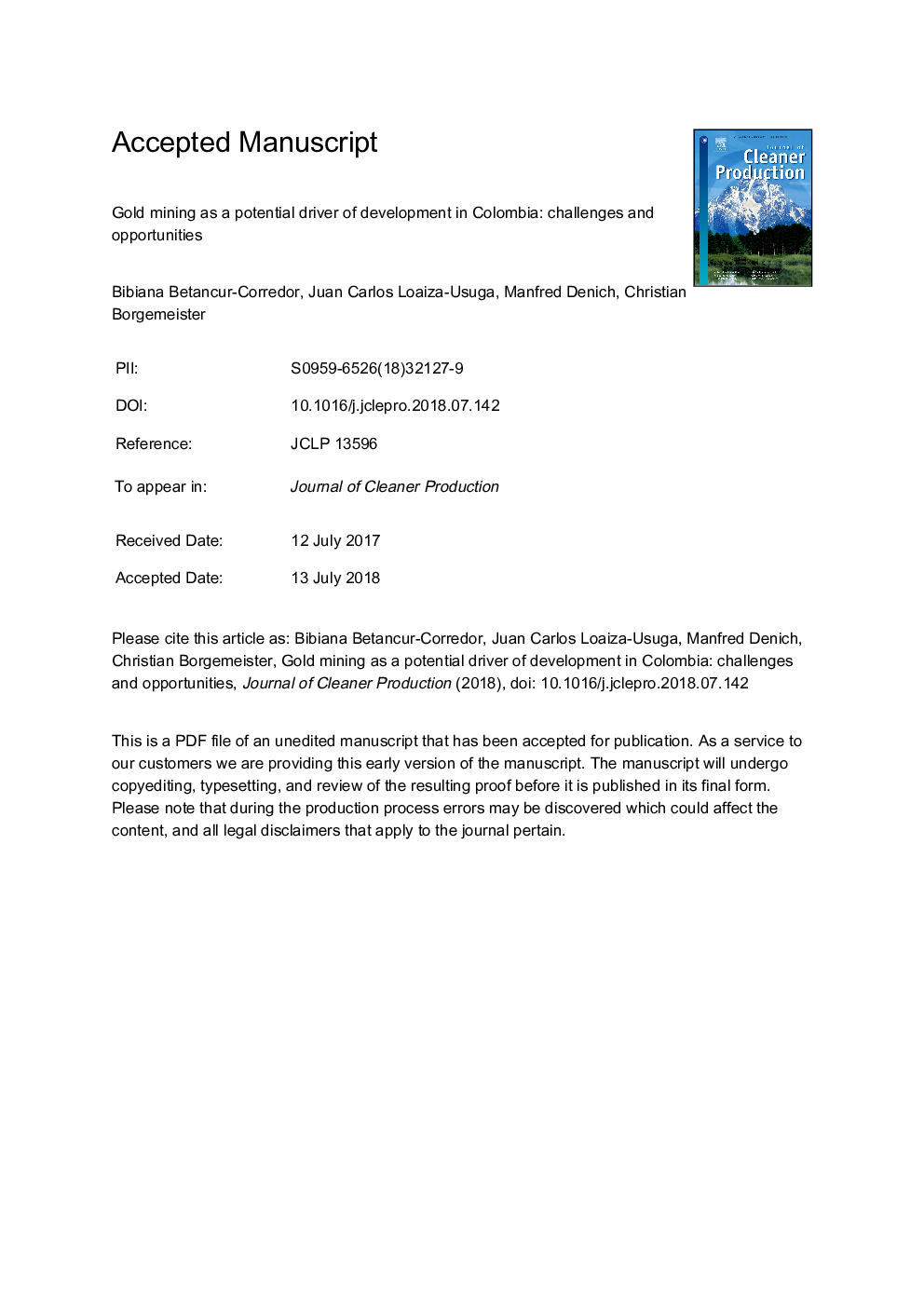| کد مقاله | کد نشریه | سال انتشار | مقاله انگلیسی | نسخه تمام متن |
|---|---|---|---|---|
| 8093236 | 1522053 | 2018 | 58 صفحه PDF | دانلود رایگان |
عنوان انگلیسی مقاله ISI
Gold mining as a potential driver of development in Colombia: Challenges and opportunities
ترجمه فارسی عنوان
معدن طلا به عنوان یک رقیب بالقوه توسعه در کلمبیا: چالش ها و فرصت ها
دانلود مقاله + سفارش ترجمه
دانلود مقاله ISI انگلیسی
رایگان برای ایرانیان
کلمات کلیدی
اثرات زیست محیطی، تأثیر اجتماعی، معدن طلای پایدار، درگیری زیست محیطی، مسئولیت اجتماعی شرکت،
ترجمه چکیده
چالش های اصلی زیست محیطی بخش معدنکاری طلا در کلمبیا، آلودگی اکوسیستم های طبیعی از طریق تولید زباله های جامد، انتشار جیوه در جریان ادغام طلا و انتشار گازهای گلخانه ای است. برای مقابله با این چالش ها احیا دفع زباله ها از طریق جنگلداری، کشاورزی و جنگل زدایی انجام می شود. علاوه بر این، فناوری های کاهش جیوه در مناطق معدنی طلای استفاده شده است و آزمایشات برای احیای اکوسیستم های آلوده صورت گرفته است. چالش های اصلی اجتماعی معادن طلا، سطوح بالای فقر، غیر قانونی و خشونت جوامع ساکن در مناطق معدنی طلا و همچنین میزان بالای غیرمالی بودن معادن طلا است. برای مقابله با این چالش ها، جوامع به طور جدی در طرح های احیای شرکت های استخراج طلا در بسیاری از مناطق کشور به منظور بازگرداندن معیشت و بهبود وضعیت سلامت خود مشارکت دارند. علاوه بر این، عناصر مسئولیت اجتماعی شرکتی برای جبران خسارات معیشتی، اثرات بهداشتی و دیگر پیامدهای اجتماعی فعالیت های معدن طلا در نظر گرفته می شود. برای دستیابی به پایدارتر ساختن معادن طلا در کشور، ضروری است که چارچوبی برای ارزیابی پایداری برای حمایت از تصمیم گیری در بخش ایجاد شود. تلاش برای بهبود بهره وری منابع و حفاظت از تنوع زیستی باید انجام شود. از دیدگاه اجتماعی، باید مسئولیت های اجتماعی مسئولیت اجتماعی را تقویت کرد، به خصوص در درک نیازهای جوامع محلی و ایجاد سازوکار مشارکتی که می تواند به جلوگیری از درگیری های اجتماعی در اطراف مناطق معدنی طلا کمک کند.
موضوعات مرتبط
مهندسی و علوم پایه
مهندسی انرژی
انرژی های تجدید پذیر، توسعه پایدار و محیط زیست
چکیده انگلیسی
The main environmental challenges of the gold mining sector in Colombia are the pollution of natural ecosystems through the generation of solid waste, emissions of mercury during gold amalgamation, and greenhouse gas emissions. To cope with these challenges, reclamation of waste deposits is being conducted through silviculture, agriculture and reforestation. Furthermore, mercury reduction technologies have been adopted in gold mining areas and trials for remediation of polluted ecosystems are being conducted. The main social challenges of the gold mining sector are high levels of poverty, illegality and violence of communities living in the gold mining areas, as well as high levels of informality of gold mining. To cope with these challenges, the communities are being actively involved in the reclamation schemes of gold mining companies in many areas of the country with the aim to restore their livelihoods and improve their wellbeing. Moreover, elements of corporate social responsibility are being implemented to compensate for the loss of livelihoods, health effects and other social consequences of gold mining activities. To achieve a more sustainable gold mining production in the country, it is necessary to develop a framework for sustainability assessments to support decision making in the sector. Efforts need to be made to improve resource-use efficiency and biodiversity protection. From the social perspective, corporate social responsibility practices should be strengthened, especially towards understanding the needs of the local communities and the creation of mechanisms of participation that could help to prevent social conflicts around gold mining areas.
ناشر
Database: Elsevier - ScienceDirect (ساینس دایرکت)
Journal: Journal of Cleaner Production - Volume 199, 20 October 2018, Pages 538-553
Journal: Journal of Cleaner Production - Volume 199, 20 October 2018, Pages 538-553
نویسندگان
Bibiana Betancur-Corredor, Juan Carlos Loaiza-Usuga, Manfred Denich, Christian Borgemeister,
